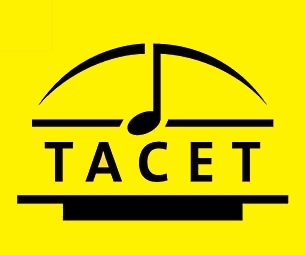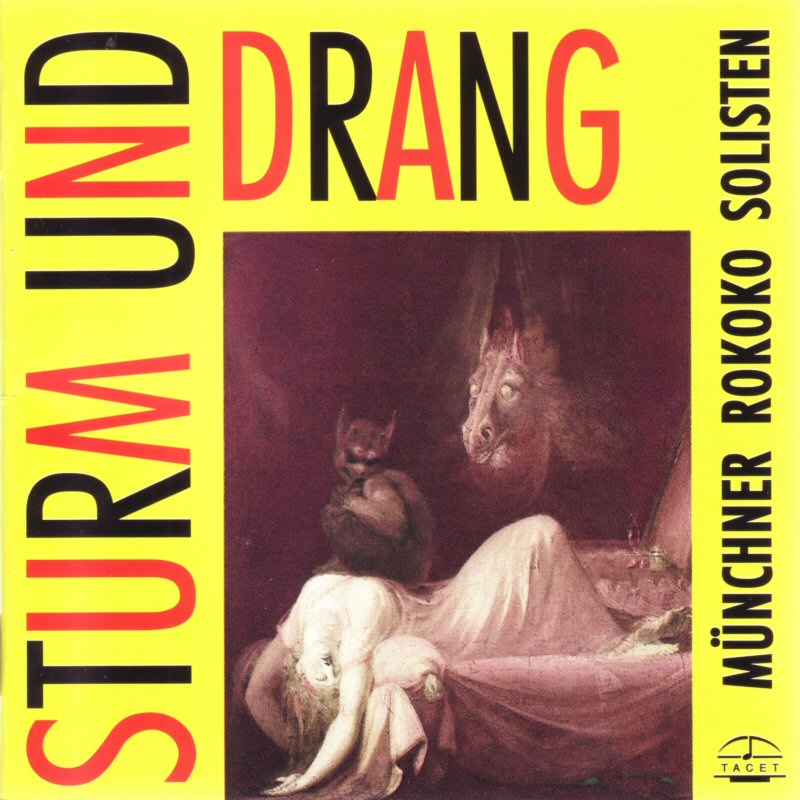0018-0 CD
Sturm und Drang Vol. 1
C. Ph. E. Bach: Sonate WQ 161 A, Sonate WQ 55, 6
Schaffrath: Trio B-Dur
Kleinknecht: Sonate h-Moll
W. F. Bach: Fantasie e-Moll
Beethoven: Trio WoO 37
Münchner Rokoko Solisten. Dieter Traube, Sprecher
EAN/barcode: 4009850001805
"There is an interesting and innovative concept here in attempt to link musical Sturm und Drang (Storm and Stress) with the mid-eighteenth century literary movement from which it took its name. Short readings in the original German (none longer than forty seconds, if this idea worries you) are interspersed between each work..." (Fanfare) "CHURNED UP... Texts of this time, recited like mottos between the pieces for hammer clavier or wind instruments with continuo, remind us of the literary origin of the uprising against common sense and convention; the well-researched booklet essays on social and musical history complete the product. The Munich Rococo Soloists vividly and dramatically present the mixed-up, bubbling nature of this music; the compositions with their lasting effect and often with exaggerated baroque rhetoric are explosive..." (FAZ)
Tracks
| Nr. No. N° |
Werk - Satz Composition - movement Oeuvre - mouvement |
Komponist Composer Compositeur |
Künstler Artist Interprète |
Dauer Duration Durée |
|
| 1 | Sonata c-Moll Wq 161a "Sanguineus und Melancholicus" für Flöte, Oboe und basso continuo | Allegretto / Presto alternierend | Carl Philipp Emanuel Bach (1714 - 1788) | Münchner Rokoko Solisten | 5:02 |
| 2 | Adagio | Carl Philipp Emanuel Bach (1714 - 1788) | Münchner Rokoko Solisten | 4:30 | |
| 3 | Allegro | Carl Philipp Emanuel Bach (1714 - 1788) | Münchner Rokoko Solisten | 4:38 | |
| 4 | Jede Form, auch die gefühlteste... | gesprochener Text | Johann Wolfgang von Goethe | Dieter Traupe | 0:22 |
| 5 | Sonata G-Dur Wq 55,6 für Hammerklavier aus den 6 Sonaten für Kenner und Liebhaber | Allegretto moderato | Carl Philipp Emanuel Bach (1714 - 1788) | Münchner Rokoko Solisten | 6:08 |
| 6 | Andante | Carl Philipp Emanuel Bach (1714 - 1788) | Münchner Rokoko Solisten | 3:43 | |
| 7 | Allegro di molto | Carl Philipp Emanuel Bach (1714 - 1788) | Münchner Rokoko Solisten | 4:27 | |
| 8 | Um aber deine Ichheit auch in der Musik herauszutreiben... | gesprochener Text | Daniel Schubart | Dieter Traupe | 00:30 |
| 9 | Trio B-Dur für Oboe, Fagott und Basso continuo | Poco andante | Christoph Schaffrath (1709 - 1763) | Münchner Rokoko Solisten | 3:11 |
| 10 | Adagio | Christoph Schaffrath (1709 - 1763) | Münchner Rokoko Solisten | 2:13 | |
| 11 | Allegro | Christoph Schaffrath (1709 - 1763) | Münchner Rokoko Solisten | 2:05 | |
| 12 | Was nicht schlaff am Herzen abprallt... | gesprochener Text | Daniel Schubart | Dieter Traupe | 0:40 |
| 13 | Sonate h-Moll für Flöte und Basso continuo | Adagio | Jakob Kleinknecht (1722 - 1794) | Münchner Rokoko Solisten | 3:49 |
| 14 | Allegro smanioso | Jakob Kleinknecht (1722 - 1794) | Münchner Rokoko Solisten | 3:20 | |
| 15 | Presto | Jakob Kleinknecht (1722 - 1794) | Münchner Rokoko Solisten | 2:20 | |
| 16 | Das Gesetz bringt es so mit sich... | gesprochener Text | Friedrich Schiller | Dieter Traupe | 0:26 |
| 17 | Fantasie e-Moll für Cembalo solo | Wilhelm Friedemann Bach (1710 - 1784) | Münchner Rokoko Solisten | 10:09 | |
| 18 | Ich bin nicht schlimm... | gesprochener Text | Ludwig van Beethoven (1770 - 1827) | Dieter Traupe | 00:36 |
| 19 | Trio G-Dur WoO 37 für Flöte, Fagott und Hammerklavier | Allegro | Ludwig van Beethoven (1770 - 1827) | Münchner Rokoko Solisten | 8:12 |
| 20 | Adagio | Ludwig van Beethoven (1770 - 1827) | Münchner Rokoko Solisten | 5:02 | |
| 21 | Thema andante con variazioni | Ludwig van Beethoven (1770 - 1827) | Münchner Rokoko Solisten | 5:08 | |
total playing time: 76:34
See reviews for this production
![]() FAZ (01/01/1992):
FAZ (01/01/1992):
![]() Fanfare (01/01/1992):
Fanfare (01/01/1992):

